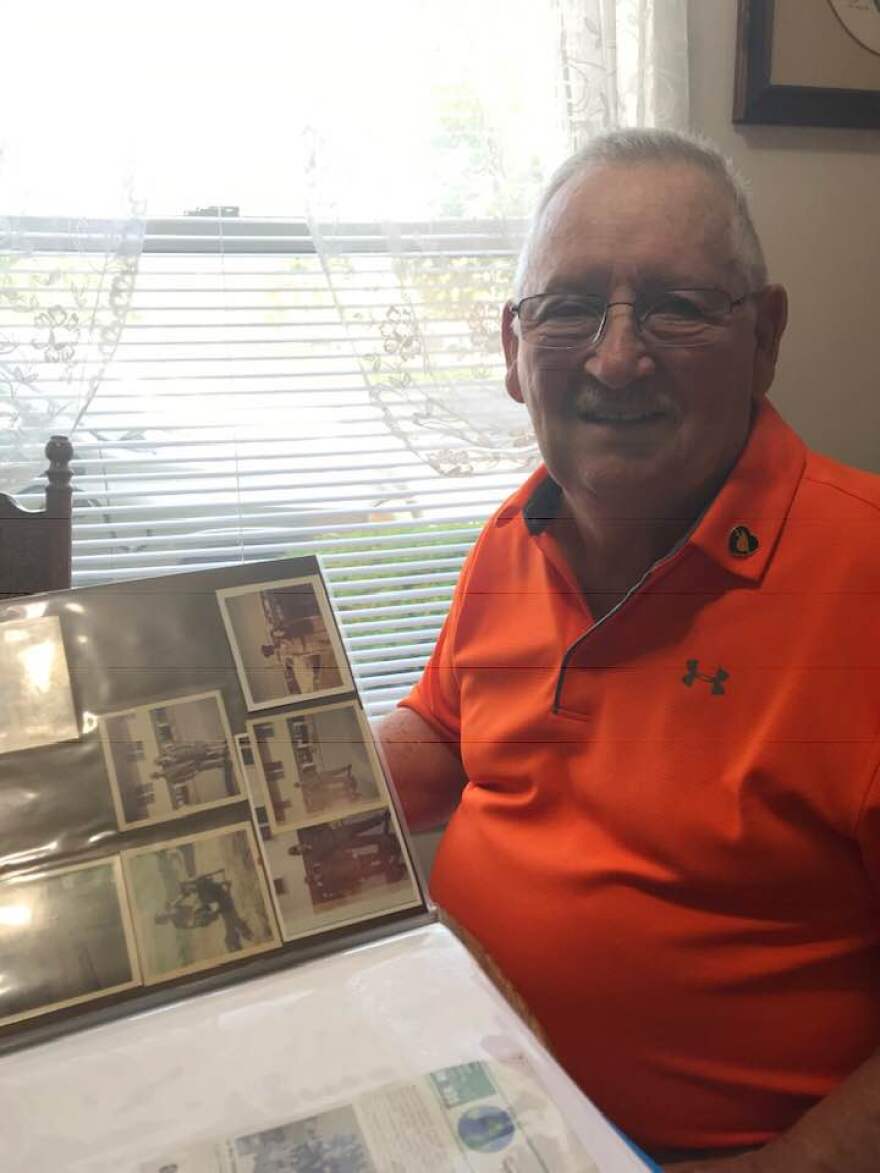Monday is Memorial Day, a time when the nation will pause to remember the men and women who died while serving in the military. More than four decades after the Vietnam War, some veterans in Kentucky and elsewhere say the conflict is still claiming casualties.
“This guy here, he and I were on the same team in Vietnam, said Hardin County veteran Denzil Lile. "That’s Billy Smith, he was the first one to get killed from Metcalfe County. Me and him was drafted on the same day.”
Denzil Lile looked through a scrapbook at the kitchen table in his apartment in Elizabethtown. There's one of him with a black Labrador Retriever.
“I was a dog handler. His name was Joey B-388, which he came from the British and was called the queen’s dog, Lile said. "They tracked. They worked more off of a ground scent.”
Lile is one of about 125,000 Kentuckians who served in the military during the Vietnam War and many were exposed to a harmful herbicide known as Agent Orange. The U.S. military sprayed the chemical to clear vegetation so Viet Cong wouldn’t have a hiding place, but the toxic chemicals did more than that. Agent Orange left a medical legacy for veterans and their families.
“I had a little blister to come up under my watch while I was in Vietnam, and for the next several years, my face would tan in different colors," recalled Lile. "I never thought much about it because it was just another thing you got in the jungle, until we got to hearing about it (Agent Orange) later on. I had a basal melanoma taken off my nose right here.”

Lile pointed to a small indention on his nose. He suspects his skin cancer was caused by exposure to Agent Orange, but that was never confirmed by the Department of Veterans Affairs. Lile considers himself one of the lucky ones after seeing some comrades pass away from illnesses related to Agent Orange.
Medical conditions are showing up more in Vietnam veterans as they age. The VA has said that every soldier with boots on the ground in Vietnam was exposed to Agent Orange. It’s been linked to multiple health problems in veterans and birth defects in their children and grandchildren.
Vietnam veteran Ronald Howell of Bowling Green receives VA medical care and a monthly stipend because his diabetes was linked to Agent Orange. He’s also in remission from colon and thyroid cancer, which the VA hasn’t connected to his exposure. At 72, Howell said he’s old enough now that it doesn’t matter. He’s more concerned about his two granddaughters.
“The first one, I think may be affected, but I don’t know," Howell commented. "She started college last year, but when she was born, she couldn’t hear out of one ear and one kidney didn’t develop.”

More than 40 years after serving in Vietnam, David Cowherd is on another mission, but this one is educational. Cowherd is president of the Vietnam Veterans of America Chapter 1051 in Elizabethtown. Cowherd also has cancer related to Agent Orange and receives compensation from the VA. For the past year or so, he’s been holding town halls across Kentucky.
“Most all families have no clue that it can go on past one generation," Cowherd said at a Glasgow town hall. "I’ve talked to people where it’s skipped generations and gone into grandchildren. They say, ‘Now I know why my child is so sick all the time. Something finally makes sense.’”
Congress passed the Agent Orange Act in 1991, which allows Vietnam veterans to receive compensation for their illnesses. The VA has declared specific conditions, from diabestes to cancer, tied to presumptive exposure to Agent Orange.
Veterans advocates want the VA to include more medical conditions presumptive to exposure to Agent Orange and enable Vietnam veterans' descendants to receive treatment and compensation.
For children born to female Vietnam veterans, the VA recognizes about a dozen maladies as being directly connected to Agent Orange exposure. For children of men who served in Vietnam, the VA recognizes only Spina Bifida.
Groups like Vietnam Veterans of America are holding public meetings and helping children and grandchildren file claims, but for now, most of those claims are being denied.
Service officers say it’s also important for veterans’ family members get on the Agent Orange registry. It includes the names of those concerned about medical conditions that may have resulted from exposure to Agent Orange. Those eligible may qualify for a VA examination.
In 2017, legislation was passed by Congress that called for the VA to research the generational impact of veterans’ exposure to toxic chemicals not just in Vietnam, but other wars. The study hasn’t begun, according to Cowherd. The Veterans Affairs Medical Center in Louisville didn't respond to questions for this report.











